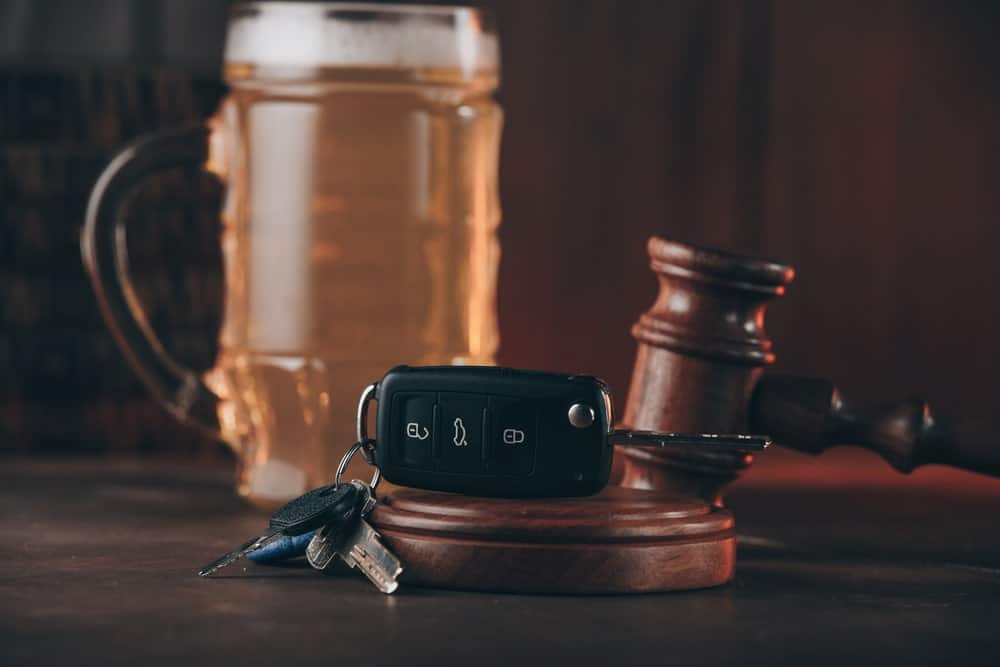Experienced Maine OUI Lawyers
Defending against OUI offenses in Southern Maine
If you have been arrested and charged with Operating Under the Influence (OUI) in Maine, you are facing serious legal and personal consequences. A conviction can lead to license suspension, hefty fines, increased insurance rates, and even jail time—all of which can significantly impact your future. Maine enforces strict OUI laws, including a zero-tolerance policy for drivers under 21, meaning even the slightest trace of alcohol can result in an arrest.
Beyond legal penalties, a criminal OUI charge can disrupt your daily life, making it difficult to get to work, school, or fulfill personal obligations. At The Maine Criminal Defense Group, we focus on protecting your rights and fighting for the best possible outcome in your case. Whether this is your first offense or you have prior OUI convictions, having an experienced Maine OUI lawyer on your side can make all the difference.
Call 207-571-8146 or contact us online to schedule a consult with one of our highly skilled criminal defense & OUI lawyers, serving Southern Maine, today.
Table of Contents
Common Concerns About OUI Charges in Maine
OUI Resources for Maine
OUI Penalties Underage OUI Felony OUI OUI Habitual Offenders Implied Consent Laws OUI Field Sobriety Testing
OUI meaning in Maine
In Maine, Operating Under the Influence (OUI) is the legal term for impaired driving offenses, encompassing both alcohol and drug-related impairment. While some states use the term DUI (Driving Under the Influence) or DWI (Driving While Intoxicated), Maine law specifically classifies impaired driving as OUI—making no distinction between alcohol, prescription drugs, or illegal substances when it comes to impairment.
If you are stopped by law enforcement under suspicion of impaired driving, you may be asked to perform field sobriety tests or take a breathalyzer or blood test. It is important to know that Maine has implied consent laws, meaning refusing a chemical test can result in an automatic license suspension and additional penalties, even if you are not ultimately convicted of OUI.
Additionally, you can face OUI charges even if your blood alcohol concentration (BAC) is below 0.08%. If an officer determines that your ability to operate a vehicle is impaired by alcohol, drugs, or a combination of both, you can still be arrested and charged. This means that even prescription medications or small amounts of alcohol can lead to an OUI arrest if they affect your ability to drive safely.
A conviction for OUI in Maine can have serious and lasting consequences, but a strong legal defense can help protect your future. If you are facing OUI charges, it is crucial to have an experienced Maine OUI lawyer who understands the complexities of these cases and can challenge the prosecution’s evidence.
Is an OUI a criminal offense in Maine? (Video)
Getting your drivers license back after an OUI in Maine
To regain your driver’s license after an OUI in Maine, a lawyer can guide you through the necessary steps. The steps may include a license suspension period, completing an OUI education program, installing an ignition interlock device, obtaining SR-22 insurance, paying reinstatement fees, and securing clearance from the Secretary of State’s office.
It’s crucial to seek the legal assistance of William Bly and his team for personalized guidance through the OUI process.
Call 207-571-8146 or contact us online to schedule a consult with one of our highly skilled criminal defense & OUI lawyers, serving Southern Maine, today.
1st OUI Penalty
Being charged with Operating Under the Influence (OUI) in Maine is a serious offense, even for a first-time offender. A conviction can result in harsh penalties that affect your freedom, finances, and future opportunities. Maine enforces strict OUI/DUI laws, and even a first offense can lead to significant legal and personal consequences.
Penalties for a First OUI Conviction in Maine
If you have no prior OUI, DUI, or DWI convictions in Maine or any other state, a first-time OUI is typically classified as a misdemeanor offense. However, the penalties remain severe:
- Mandatory minimum 150-day license suspension
- $500 fine, plus additional court fees
- No eligibility for a work-only license for the first 100 days
Additionally, if you refuse a breathalyzer or blood test, your penalties become even more severe due to Maine’s implied consent law. Refusing chemical testing results in:
- A mandatory minimum of 96 hours in jail
- Increased license suspension periods
Aggravating Factors That Increase Penalties
Certain circumstances can elevate the penalties of a first-time OUI, leading to harsher consequences. These include:
- BAC of 0.15% or higher
- Excessive speeding (30+ mph over the speed limit)
- Passengers under the age of 21 in the vehicle
If any of these factors are present, you face a mandatory minimum jail sentence of 48 hours, in addition to the standard first-time OUI penalties.
Reinstating Your License
After 30 days without a license, you may qualify for early reinstatement under certain conditions:
- Completion of an alcohol education program
- Installation of an Ignition Interlock Device (IID) until the suspension period ends
A first-time OUI conviction can have lasting repercussions on your driving record, employment opportunities, and auto insurance rates. The best way to protect yourself is by securing experienced legal representation. At The Maine Criminal Defense Group, we fight to reduce or dismiss charges, helping you move forward with minimal impact on your future.
2nd OUI Penalty
A second OUI offense in Maine carries harsher penalties than a first-time conviction, as the state imposes strict consequences for repeat offenders. If you are charged with a second OUI within 10 years of a prior conviction—whether in Maine or another state—you will face severe legal repercussions that can impact your freedom, driving privileges, and financial stability.
Penalties for a Second OUI Conviction in Maine
A second OUI is classified as a misdemeanor offense but comes with mandatory penalties, including:
- Minimum 7 days in jail (with the possibility of a longer sentence)
- Mandatory 3-year license suspension
- Registration suspension for 3 years
- $700 fine, plus court fees and other costs
- No eligibility for a work-restricted license during the first three years
Refusing a Breath or Blood Test on a Second Offense
Maine enforces an implied consent law, meaning that refusing a breathalyzer or blood test leads to automatic penalties. If you refuse a chemical test for a second time within 10 years, the consequences are even more severe:
- Minimum 12 days in jail
- $900 fine, plus additional court costs
- 3-year license suspension with no eligibility for a work license
- 3-year suspension of vehicle registration
Reinstating Your License After a Second OUI
To regain full driving privileges after a minimum of nine months without a license, you must:
- Complete a state-approved alcohol education program
- Install an Ignition Interlock Device (IID) for two years
A second OUI conviction in Maine can have lasting consequences on your personal and professional life. If you are facing charges, securing an experienced Maine OUI lawyer is crucial. At The Maine Criminal Defense Group, we build strong defenses to challenge the prosecution’s case and fight for the best possible outcome.
Call 207-571-8146 or contact us online to schedule a consult with one of our highly skilled criminal defense & OUI lawyers, serving Southern Maine, today.
3rd OUI Penalty
A third OUI conviction within ten years is a felony offense in Maine, carrying significantly harsher penalties than prior offenses. Additionally, if an OUI results in serious bodily injury, the charge is elevated to a Class C felony, leading to long-term consequences, including prison time, extended license suspensions, and steep fines.
Penalties for a Third OUI Conviction in Maine
If convicted of a third OUI offense within 10 years, you will face:
- Class C felony charges
- Minimum 30 days in jail (40 days if you refuse a breathalyzer or blood test)
- Up to 5 years in prison
- $1,100 minimum fine ($5,000 maximum fine)
- 2 years of probation
License Suspension and Driving Restrictions
A third OUI conviction also results in severe restrictions on your ability to drive:
- 6-year license suspension (with no eligibility for a work-restricted license)
- Vehicle registration suspension for the same duration
- Completion of an alcohol awareness program is required for license reinstatement
- Mandatory installation of an Ignition Interlock Device (IID) for 3 years after serving the full suspension
The High Stakes of a Third OUI Conviction
A felony OUI conviction can have a devastating impact on your future. You may lose your ability to drive for years, face challenges securing employment, and have a permanent felony record that affects housing, professional licensing, and firearm rights.
If you are facing a third OUI charge in Maine, you need an experienced defense attorney who can fight to reduce or dismiss the charges. At The Maine Criminal Defense Group, we understand the complexities of OUI cases and work aggressively to protect your rights and minimize the impact on your life.
Fourth OUI Penalty
A fourth OUI offense within 10 years is a Class C felony in Maine, carrying some of the harshest penalties for repeat offenders. A felony OUI conviction can have long-term consequences, including extended jail time, financial penalties, and loss of driving privileges for nearly a decade. If you have been charged with a fourth OUI, it is crucial to seek experienced legal representation immediately to protect your future.
Penalties for a Fourth OUI Conviction in Maine
A fourth OUI conviction comes with severe mandatory penalties, including:
- Minimum of 6 months and 20 days in jail (longer if aggravating factors apply)
- Up to 5 years in prison
- $2,100 minimum fine ($2,500 if you refuse a breath or blood test)
- Maximum fine of $5,000
- 2 years of probation
License Suspension and Driving Restrictions
In addition to the felony penalties, a fourth OUI conviction results in significant driving restrictions:
- 8-year driver’s license suspension (no eligibility for a work-only license)
- Suspension of vehicle registration for the same duration
- Completion of a state-approved alcohol education program required for reinstatement
- Mandatory Ignition Interlock Device (IID) installation for 4 years after license suspension ends
Serious Consequences of a Fourth OUI Conviction
A felony OUI conviction affects more than just your ability to drive—it can have life-altering consequences:
- A permanent felony record that can impact job opportunities and housing
- Loss of professional licenses in certain industries
- Firearm restrictions due to felony classification
- Higher insurance costs and difficulty obtaining coverage
If you are facing a fourth OUI charge, you need an aggressive Maine OUI defense attorney to challenge the case against you. At The Maine Criminal Defense Group, we fight to reduce penalties, challenge evidence, and protect your rights in court. Don’t face these charges alone—contact us today for a strong, strategic defense.
Call 207-571-8146 or contact us online to schedule a consult with one of our highly skilled criminal defense & OUI lawyers, serving Southern Maine, today.
Maine OUI Enhancements for Injuries and Fatalities
In Maine, an OUI involving an accident with serious injury or death carries severe penalties. In the case of serious injury, it is classified as a Class C felony and entails the following penalties:
- A maximum prison sentence of five years, a $5,000 fine, and a two-year probation period.
- A minimum jail term of six months and a fine starting at $2,100.
- A six-year license suspension without eligibility for a work-only license and suspension of the right to register a vehicle.
For OUI fatalities, it is classified as a more serious Class B felony with the following penalties:
- A maximum prison sentence of ten years, a fine ranging from $2,100 to $20,000, and a ten-year license suspension.
- A minimum jail term of six months and a fine starting at $2,100.
- A fatality or injury OUI conviction remains on the driver’s record indefinitely and can lead to increased penalties for future OUI convictions.
Additionally, attendance at alcohol school is mandatory. After three months of not driving and completing alcohol school, full license reinstatement is allowed, provided an Ignition Interlock Device is installed for three years.
License suspension for excessive blood-alcohol levels in Maine
Being charged with Operating Under the Influence (OUI/DUI) in Maine can lead to immediate license suspension, even before your court case is resolved. If your blood alcohol concentration (BAC) is 0.08% or higher, the Maine Bureau of Motor Vehicles (BMV) has the authority to suspend your driver’s license automatically, regardless of whether you are convicted in court. This administrative penalty can have a major impact on your daily life, affecting your ability to work, attend school, or meet personal obligations.
How Maine’s Administrative License Suspension Works
- If you fail a breath, blood, or urine test with a BAC of 0.08% or above, the BMV will issue a license suspension before your court date.
- This is an administrative penalty separate from any criminal charges you may face.
- The length of the license suspension varies based on whether it is your first, second, or subsequent OUI offense.
- The suspension takes effect immediately, making it critical to act fast if you want to challenge it.
How to Challenge an OUI License Suspension in Maine
If you have been notified of a license suspension due to excessive BAC, you have the right to request a hearing to challenge it. However, you must act quickly:
- You must submit a written request for a BMV hearing within 10 days of receiving the suspension notice.
- Failing to request a hearing within this timeframe means your suspension will remain in effect, regardless of the outcome of your criminal case.
- At the hearing, an experienced Maine OUI defense lawyer can present evidence, question the validity of the BAC test, and argue for a reduction or dismissal of the suspension.
Additional License Suspension for Drivers with Underage Passengers
Maine imposes harsher penalties for drivers aged 21 and older who are caught operating under the influence with a passenger under the age of 21 in the vehicle. In these cases:
- A mandatory 275-day license suspension is added to the original suspension period.
- This penalty applies even if it is your first offense and regardless of whether you are ultimately convicted in court.
Call 207-571-8146 or contact us online to schedule a consult with one of our highly skilled criminal defense & OUI lawyers, serving Southern Maine, today.
Does an OUI show up on a background check in Maine?
An OUI conviction in Maine can potentially show up on a background check. Background checks typically include information on criminal records, and an OUI is considered a criminal offense. It is important to note that background check procedures can vary depending on the specific circumstances and the entity conducting the check.
Having an OUI on your record can have various implications, such as affecting employment opportunities, professional licenses, or other aspects of your personal and professional life. However, it is worth noting that some background checks may only go back a certain number of years or have limitations on the types of offenses they report.
If you are concerned about how an OUI charge or conviction might impact your background check, it is advisable to consult with an experienced OUI defense attorney. They can provide you with valuable insights and help you understand the potential consequences of having an OUI on your record. Additionally, a skilled attorney can work toward minimizing the impact of the charge and explore possible avenues for a Petition for Clemency to seal parts of a record or other legal remedies to mitigate the long-term effects.
Can You Get an OUI Expunged in Maine?
In Maine, expungement of an OUI on your record is NOT allowed. Individuals with specific convictions can possibly request Executive Clemency from the Governor of Maine. However, Executive Clemency doesn’t completely erase the criminal record like expungement does, and rarely granted, with limited impact.
Refusal to submit to implied consent testing in Maine
The implied consent laws in Maine mean that you cannot refuse to submit to a blood, urine or breath test if requested by a police officer.
If you do refuse a breath test, you will face the following administrative BMV penalties:
- A 275-day license suspension for a first refusal
- An 18-month operator license suspension for a second refusal within 10 years
- A three-year driver’s license suspension for a third refusal within 10 years
- A six-year operator’s license suspension for a fourth refusal within 10 years
- An 18-month driver’s license suspension for a first refusal by a driver aged under 21
- A 30-month driver’s license suspension for a second refusal by a driver aged under 21
Call 207-571-8146 or contact us online to schedule a consult with one of our highly skilled criminal defense & OUI lawyers, serving Southern Maine, today.
Types of OUI charges in Maine
Underage OUI
Our state operates under the zero-tolerance rule, which means that if a driver is under the age of 21 and is found to have any amount of alcohol in their blood, they could be accused and charged with OUI.
This could greatly affect their future and have significant repercussions.
OUI Accidents
If you were accused of causing an accident while driving under the influence of alcohol, you could be facing harsh consequences.
When serious bodily injury or death occurs as a result of driving under the influence of alcohol, the crime will be enhanced to a higher level.
OUI related injuries
If you were accused of causing an accident while driving under the influence of alcohol, you could be subject to stricter penalties. When the victim of the accident sustained a serious bodily injury rather than just property damage, you need to ensure that you have a strong representative on your side.
Felony OUI
Typically a felony OUI occurs when a person has multiple prior OUI convictions within a specific timeframe, usually over a 10-year period. When someone accumulates three or more prior OUI convictions, their subsequent OUI charge can be classified as a felony. Felony OUI convictions carry much more severe penalties, including longer license suspensions, significant fines, and potential imprisonment.
Vehicular manslaughter
The most serious charge to be facing in relation to OUI is vehicular manslaughter. When an individual is killed because of a drunk driver, there will be serious repercussions.
Also known as vehicular homicide, the penalty in Maine includes up to twenty years in prison. Not only that, but you could be given heavy fines as well as lose your driver’s license for an extended amount of time.
Of course, there is also the possibility that the decedent’s family will bring a civil lawsuit against you for wrongful death.
Leaving the scene (hit and run)
When any accident occurs, it is against the law to leave the scene of the accident until you have exchanged contact information with other involved parties and sought medical attention if anyone was injured.
If you were shown to be under the influence of alcohol at the time of the crash, leaving the scene will only add to the penalties you could be facing.
OUI from out of state
If you were accused of an OUI while out of state, you could be facing penalties in both states.
For this reason, it is important to ensure that you have qualified assistance from someone who understands the complications which can arise from these types of cases.
OUI & suspended driver’s license
It may seem like a suspended license is one of the least serious types of penalties you could be facing following an OUI conviction.
The reality is it could greatly hinder your ability to get to work and support yourself and your family.
In cases where the accused was in possession of a commercial driver’s license, they could risk permanently losing their driver’s license and thus, their livelihood.
Call 207-571-8146 or contact us online to schedule a consult with one of our highly skilled criminal defense & OUI lawyers, serving Southern Maine, today.
Boating under the influence (BUI)
According to the U.S. Coast Guard, alcohol consumption is more dangerous on water than on land. Boating under the influence will include the factors of water motion and glare, as well as the fact that boating operators generally have less experience than motor vehicle drivers.
Those convicted of BUI will be subject to the same penalties as someone accused of DUI.
Commercial Driver’s License OUI
When a driver has a commercial driver’s license (CDL), they are subject to different rules and regulations. Rather than the legal limit being 0.08%, they will instead be subject to a much lower standard of 0.04% if they’re driving a commercial motor vehicle and charged with an OUI.
If they are driving a car, the .08% standard applies. This is extremely serious as it means that they could lose their license and, with it, their ability to support themselves and their family.
Child endangerment & operating under the influence
When a driver has a passenger in their car who is under 21 and they are accused of OUI, their penalties will be enhanced.
They will be facing at least 48 hours behind bars, have their license suspended for 90 days, and be fined at least $500.
OUI Child endangerment charges could also bring up issues of child neglect and you could potentially lose your children.
Why you should never plead guilty to an OUI in Maine (Video)
Watch this video where William Bly explains exactly why you should never plead guilty to a drunk driving charge in Maine. This is an emotionally highten period in your life. Take a step back and understand what your options are moving forward.
Challenging an OUI in Maine: How to Fight Your Charges
If you have been charged with Operating Under the Influence (OUI) in Maine, you may feel overwhelmed and uncertain about your next steps. However, an OUI charge is not an automatic conviction—there are multiple ways to challenge the evidence and fight for a dismissal or reduction of the charges.
At The Maine Criminal Defense Group, we aggressively defend clients by examining every aspect of their case, from the traffic stop to the chemical testing procedures and the legality of the arrest.
Challenging Field Sobriety, Breath, and Blood Tests
One of the most critical elements of an OUI case is the evidence from field sobriety tests, breath tests, or blood tests. However, these tests are not always accurate or reliable.
We will investigate:
- Field Sobriety Test Accuracy – These tests are subjective and can be influenced by fatigue, medical conditions, or poor weather conditions.
- Breathalyzer Calibration & Errors – Breath testing devices must be properly maintained and calibrated. If the machine was not functioning correctly, the results could be inadmissible.
- Blood Test Chain of Custody – If there were errors in how your blood sample was collected, stored, or analyzed, the results may be invalid.
If we uncover flaws in the testing process, we can weaken the prosecution’s case and potentially get the charges reduced or dismissed.
Understanding the Maine OUI Court Process
After an OUI arrest, your case will go through a series of legal proceedings. It is crucial to understand what to expect:
- Arrest and Booking – After a traffic stop, if law enforcement suspects you of OUI, you will be taken into custody for processing.
- Preliminary Hearing – A judge will review the evidence to determine if there is probable cause to move forward with the case.
- Arraignment & Plea – You will have the opportunity to enter a guilty, not guilty, or no contest plea.
- Trial or Negotiation – Your case may proceed to trial, or we may work to negotiate a plea deal to minimize penalties.
Knowing your rights and having an experienced Maine OUI lawyer by your side can make a significant difference in your case.
BMV Hearings & Driver’s License Suspensions
Even if your criminal OUI charges are dismissed, the Maine Bureau of Motor Vehicles (BMV) can still suspend your driver’s license.
- The BMV hearing is separate from your court case and focuses only on your driving privileges.
- If your blood alcohol concentration (BAC) was 0.08% or higher, or if you refused a chemical test, the BMV may impose automatic suspension penalties.
- To challenge your suspension, you must request a BMV hearing within 10 days of your arrest.
A successful challenge at your BMV hearing could restore your driving privileges, making this a critical step in your defense strategy.
Unlawful OUI police stops in Maine
Maine law requires police officers to have reasonable suspicion before making a traffic stop. If an officer pulled you over without a valid reason, any evidence gathered after the stop may be considered inadmissible in court.
If we can prove that your rights were violated, your case could be dismissed entirely.
Ignition interlock devices in Maine
In some cases, individuals convicted of OUI may be required to install an Ignition Interlock Device (IID) as a condition of license reinstatement.
- The IID is a breathalyzer device installed in your car that prevents the vehicle from starting if alcohol is detected in your system.
- The offender must pay for both the installation and maintenance of the device.
- Depending on the circumstances, the IID may be mandatory for months or years after a conviction.
By challenging your OUI charges early, you may be able to avoid the costly and restrictive penalties associated with an IID requirement.
Call 207-571-8146 or contact us online to schedule a consult with one of our highly skilled criminal defense & OUI lawyers, serving Southern Maine, today.
What to Consider Before Hiring a Maine OUI/DUI Lawyer
Before hiring an OUI (Operating Under the Influence) lawyer in Maine, it’s essential to evaluate their experience, local knowledge, communication style, and ethical standards. Attorney William T. Bly of The Maine Criminal Defense Group offers insight into what truly matters when choosing legal representation for an OUI charge.
Experience with Maine OUI Law
OUI laws in Maine are complex and constantly evolving. It’s critical to hire a lawyer who focuses specifically on OUI defense in Maine, understands the legal nuances, and has a successful track record handling similar cases. William T. Bly has years of experience defending OUI/DUI charges throughout Maine and is known for his strategic, science-based approach—particularly when it comes to field sobriety testing and breathalyzer results.
Familiarity with Local Courts
An attorney who knows the local court system—especially in cities like Portland—can navigate cases more effectively. Bly’s long-standing presence in Maine courts means he is familiar with local judges, prosecutors, and procedures, which can significantly benefit your case.
Clear Communication and Case Strategy
You want a lawyer who listens to your concerns, communicates clearly, and explains your legal options. Attorney Bly is known for his client-centered approach and for crafting custom defense strategies that explore every angle, from challenging probable cause to questioning the reliability of chemical tests. If your case may go to trial, his courtroom experience becomes even more valuable.
Transparent Fees and Payment Options
Before committing, ask about consultation fees, flat rates, or payment plans. A trustworthy lawyer will be upfront about all costs. The Maine Criminal Defense Group offers transparent pricing and clear expectations from the beginning.
Professionalism and Ethical Standards
Avoid lawyers who promise outcomes. Instead, choose someone who sets realistic expectations and operates with integrity. Bly’s reputation for professionalism and ethical advocacy has earned him the trust of clients and respect from the legal community statewide.
Hiring the right OUI lawyer in Maine can make a major difference in the outcome of your case. Attorney William T. Bly combines deep legal knowledge, local insight, and proven courtroom skill to give you a strong defense. Schedule a consultation with The Maine Criminal Defense Group to protect your rights and future.
Contact our Maine OUI/DUI Lawyers Today
Facing an OUI charge in Maine can be overwhelming, but you don’t have to go through it alone. At The Maine Criminal Defense Group, we are dedicated to protecting the rights of those accused and fighting for the best possible outcome in every case.
Attorney William T. Bly is a highly skilled Maine OUI lawyer with extensive training in DUI defense strategies, including:
- Certified Intoxilyzer Operator & Technician – Understanding the mechanics and potential errors of breath testing devices.
- Certified Instructor in Standardized Field Sobriety Testing – Recognizing improper administration of roadside tests and challenging inaccurate results.
This specialized knowledge allows us to identify mistakes made by law enforcement, such as faulty breath tests, improper field sobriety testing, and unlawful stops—all of which could weaken the prosecution’s case or even lead to a dismissal of charges.
For many individuals, the most immediate concern after an OUI charge is losing their driver’s license. However, with the right legal strategy, you may qualify for a hardship license that allows you to drive to work, school, and medical appointments.
An OUI conviction can have long-lasting consequences, including fines, jail time, and a permanent criminal record. The sooner you contact a skilled Maine OUI attorney, the better your chances of building a strong defense.
Call The Maine Criminal Defense Group today at (207) 571-8146 or reach out online for a free consultation. With offices in Portland and Kennebunk, we proudly serve individuals across Southern Maine who are facing OUI/DUI charges. Let us fight for you.
Call 207-571-8146 or contact us online to schedule a consult with one of our highly skilled criminal defense & OUI lawyers, serving Southern Maine, today.
OUI Blog Articles

OUI cases in Maine usually start when a law enforcement officer pulls over a vehicle. From that point, many things can happen but if the officer even has a slight[...]

January 11th, 2025, in Skowhegan, Maine, a Maine Department of Transportation plow truck sustained a head-on collision caused by a drunk driver on Route 2, as reported by law enforcement.[...]

The tragic events of a fatal car crash in 2023 that claimed the lives of four young people have finally reached a pivotal legal outcome. Noelle Tavares, a former Maine[...]

In most states, there are many different places that the average person can take a driving course to satisfy court requirements as related to an DUI conviction. However, in the[...]

Defending against OUI offenses in Southern Maine Anyone charged with a 2nd OUI in Maine should expect little leniency from the criminal justice system. This makes it even more important[...]

Defending against OUI Refusals in Southern Maine Did you know that it is a criminal offense to refuse to submit to a chemical test if lawfully requested to do so[...]

Reducing an OUI charge in Maine OUI charges are handled severely in Maine. For many people, a drunk-driving charge is their first time dealing with the criminal justice system and,[...]

Alcohol laws of Maine While you should be aware of the strict OUI laws in Maine, it’s also important to know about other ways you can face a traffic infraction[...]

Defending against OUI offenses in Southern Maine A first OUI in Maine can potentially have long-term consequences, but with the right legal representation, alleged offenders can escape the harshest penalties.[...]

If you blow under .08 in a DUI breath test in Maine, it may be jumping the gun to breathe a huge sigh of relief. You may not be “free[...]


